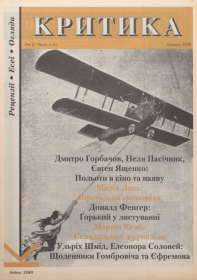The Father’s Own Voice of Socialist Truth In Krytyka, No. 4 (6), 1998, pp. 12–14.
Keywords:
depersonalization, pseudonym, socialist realism, performative silence, totalitarian discourseSynopsis
Donald Fanger's work is an attempt to critically rethink the figure of Maxim Gorkyi. The author considers Gorkyi as a figure that exists at the intersection of three planes: literary image, political function, and public myth. The author focuses on the paradox: Gorkyi, while avoiding personal autobiographical openness, became a central figure in the socialist canon. Despite his public role, he remained an inwardly closed personality. Fenger illustrates this internal division of Gorkyi's personality through the letters and memoirs of his contemporaries, Vladislav Khodasevich and Boris Eikhenbaum. Both authors emphasize the contradictions in Gorkyi's personality, while exposing the mechanisms of the formation of the Soviet myth surrounding him. Based on this evidence, Fenger demonstrates how Gorkyi's personal silence paradoxically contributed to his ideological instrumentalization. As a result, Gorkyi emerges not only as an artificially constructed cultural image, but also as a symptom of a broader process of depersonalization of the artist in the context of totalitarian discourse. Based on this, the author raises a key question: is the authenticity of a writer possible in conditions of political pressure and censorship? He analyzes the stylistic and biographical gaps between Gorkyi's public image and his private manifestations. This approach makes it possible to trace not only the transformation of Gorkyi as a personality, but also the evolution of ideas about the role of the artist in the Soviet cultural context.
Downloads




